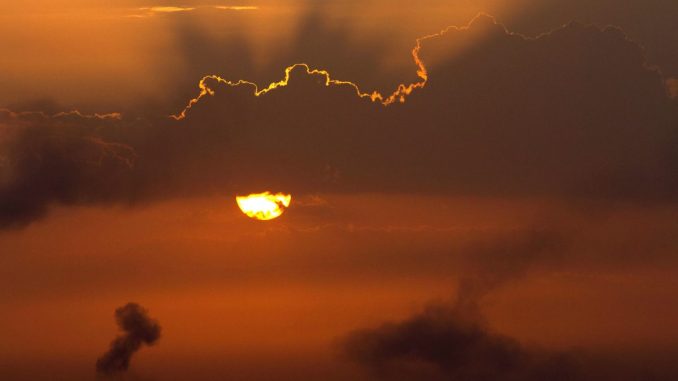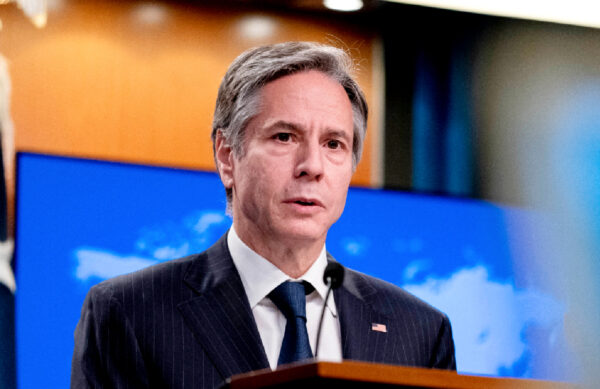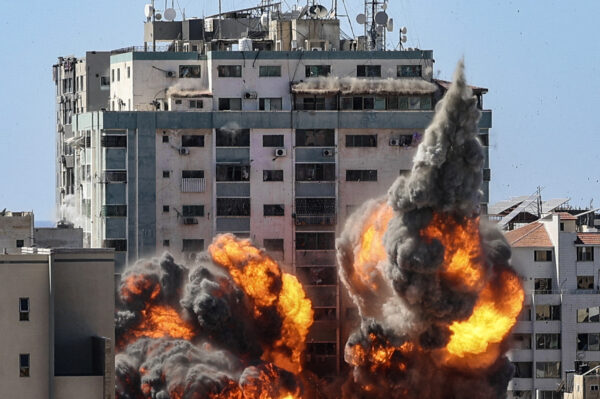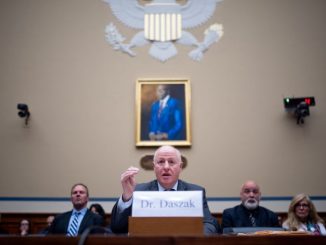
Commentary
Israel and Hamas were engaged in a military conflict this month. While the international community wants to restore peace through diplomatic mediations, China, which happens to hold the rotating presidency of the United Nations Security Council for May, has not condemned the violence. The Communist regime’s motive is questionable.
After a confrontation between Palestinians and Israeli police at the Al-Aqsa mosque compound in Jerusalem on May 7, Hamas began firing a large number of rockets at Israel. Subsequently, Israel launched an airstrike targeting senior Hamas leaders.
The conflict began with the incident at the mosque, but Hamas provoked the first military strike.
Speaking for the first time since the violence erupted, U.S. President Joe Biden on May 12 expressed hope that the military conflict would end as soon as possible, but also stated that Israel “has a right to defend itself.” The Deputy Assistant Secretary of State for Israel and Palestine also went to the Middle East as a special envoy to mediate the conflict.
Western Countries Condemn the Violence
The U.N.’s Middle East peace envoy Tor Wennesland on May 11 warned “the cost of war in Gaza is devastating” and tweeted, “Stop the fire immediately.”
Canadian Prime Minister Justin Trudeau stated on May 12 that “we need to see a cessation of the violence and attacks,” and “the rocket attacks from Hamas are absolutely unacceptable.”
On May 12, British Prime Minister Boris Johnson urged Israel and the Palestinians to “step back from the brink” and called for both sides to “show restraint.”
British Foreign Secretary Dominic Raab tweeted on May 16: “The UK condemns Hamas’s attacks on civilians, and affirms Israel’s right to self-defence” and “All sides must avoid civilian casualties.”
Raab said he has spoken about the violence with Palestinian Authority Prime Minister Mohammad Shtayyeh.
French President Emmanuel Macron spoke with the President of the Palestinian Authority, Mahmoud Abbas, on May 13 and strongly condemned the rocket launches against Israeli territory by Hamas and other terrorist groups. Meanwhile, Paris also restricted pro-Palestinian rallies to prevent serious disturbances to public order.
German Foreign Minister Heiko Maas blamed Hamas for the violence and said there would be “zero tolerance for attacks on synagogues in our country,” according to an interview with Funke media group on May 13.
U.S. Secretary of State Antony Blinken said at a press conference on May 13, “We believe that Israelis and Palestinians deserve equal measures of freedom, security, dignity, and prosperity. That recognition will continue to drive our approach.”
Blinken stressed, “Israel has a right to defend itself from these rocket attacks and the fundamental difference between a terrorist organization in Hamas that is indiscriminately targeting civilians and Israel, which is defending itself and going after those that are attacking it.”

In a call to Israeli Prime Minister Benjamin Netanyahu on May 17, President Biden expressed support for a cease-fire between Israel and Gaza’s militant Hamas rulers. According to the White House statement, Biden “encouraged Israel to make every effort to ensure the protection of innocent civilians,” while expressing support for Israel.
Meanwhile, diplomats from Arab countries also aimed at restoring peace through diplomatic efforts.
Beijing’s Response
On May 7, when the Israeli-Palestinian mosque conflict took place, Chinese Foreign Minister Wang Yi chaired the U.N. Security Council meeting and once again talked about “multilateralism.” He said that international rules “are not a patent or a privilege of a few.”
Wang touted, “This year marks the 100th anniversary of the founding of the Communist Party of China. … We stand ready to work with all parties to bring multilateralism and the U.N. forward from a new starting point and jointly build a community with a shared future for mankind.”
After the Israeli–Palestinian military conflict broke out, the U.N. Security Council held a closed-door meeting on May 11, but did not issue a statement. It was probably due to a lack of consensus.
While various countries were busy mediating diplomatically to de-escalate tension in Gaza, Wang, on the other hand, was busy meeting with the foreign ministers of the five Central Asian countries on May 12. Three days later, Wang had a phone call with the Pakistani foreign minister.
The Chinese Communist Party (CCP) didn’t do anything to stop the Israeli–Palestinian conflict, nor did it really care about the victims of the missile strikes. Instead, it took the opportunity to criticize the United States and its allies. On May 14, China’s state-run media Xinhua News published a report headlined “The Foreign Ministry Warns the US: The Lives of Palestinian Muslims are Equally Precious.”
Xinhua quoted the foreign ministry spokesperson as saying that “the United States, together with a handful of its allies like the UK and Germany” has put on a “political farce” by holding “Xinjiang-related issues falsely in the name of the United Nations” and “the United States should know that the lives of Palestinian Muslims are equally precious.”

The CCP did not condemn the rocket attacks provoked by Hamas, nor did it mention the deaths and injuries of the Israelis. The CCP does not believe that Israel has the right to defend itself. In a bid to take the focus away from the ongoing human rights abuses in Xinjiang, Beijing wanted to send the message that “the lives of the Palestinian Muslims” matter too. This is an indirect statement of the CCP’s support for the Hamas terrorist organization.
The answer to the question as to why a consensus was hard to reach after two U.N. emergency meetings on the issue should now be clear.
As the rotating president of the Security Council in May, China first openly competed for hegemony in the U.N. meetings, but did nothing in the face of the Israeli–Palestinian conflict. It is a clear indication that Beijing seriously lacks the ability to communicate with other countries, and that it doesn’t abide by the rules of fairness and justice. A global effort to de-escalate tension in the Israeli–Palestinian conflict was exploited by the CCP, which became a battlefield of its fight against the United States and Western democratic countries.
The CCP’s Possible Role Behind the Israeli-Palestinian Conflict
The CCP’s statement has repeatedly revealed its support for Hamas. Over the years, Hamas has frequently carried out armed attacks on Israel, including suicide bombings. It is regarded as a terrorist organization by Israel and Western countries. The CCP never condemned Hamas for launching rocket attacks first, but claimed that it “will continue to firmly support the Palestinian people.”
Israel and Palestine have been in conflict for a long time, and the CCP has been repeating similar statements.
There are media reports that claim Hamas rockets were provided by China. In one incident in December 2008, Hamas fired 60 rockets at Israel and Israeli security forces claimed they used Chinese-made long-range missiles. Such performance and quality are in line with the current state of the Chinese regime’s weaponry and technology.
While most countries hope that the Israeli–Palestinian conflict will calm down, the CCP is actually encouraging Hamas to continue its fight. Hamas took the lead in this attack, which is unprecedented in scale and intensity. I highly suspect that the CCP is behind the scenes.
On the surface, the CCP is confronting the United States. However, it is aware of its lack of concrete strength. That’s why when the U.S. military is preparing to withdraw from the Middle East while strengthening its deployment in the Indo-Pacific region, it is naturally nerve-wracking for the CCP.
Previously, the CCP could have counted on Russia for relief when Vladimir Putin had troops on the Ukrainian border. But the quick withdrawal of the Russian troops put the CCP back to the forefront of confronting the United States alone again, not to mention that the U.S. and Russian leaders are about to hold a summit in June.
The CCP could have also counted on Iran to cause disturbance in the Middle East, but the United States and Iran are negotiating. If Iran gets a good bargaining chip, it is naturally willing to reach an agreement with the United States, which will fail the CCP’s calculations.
As for North Korea, China’s little brother, it has also been quiet these days since the United States also extended an olive branch to Kim Jong-un’s regime.
The Chinese regime’s attitude toward the Israeli–Palestinian conflict reveals its true intent to escalate the tensions in Gaza. The CCP’s purpose is to shift international focus away from the tensions in the Indo-Pacific region and the South China Sea.
I believe that behind all the conflicts in which Hamas initiated the strikes against Israel, the CCP was its major pushing hand.
Yang Wei has been closely following China affairs for many years. He has been contributing political commentary on China for the Chinese language Epoch Times since 2019.
Views expressed in this article are the opinions of the author and do not necessarily reflect the views of The Epoch Times.





Be the first to comment